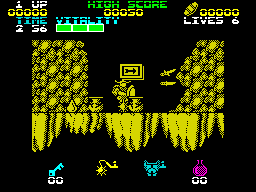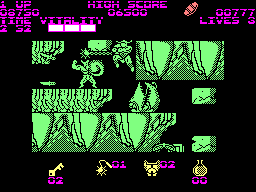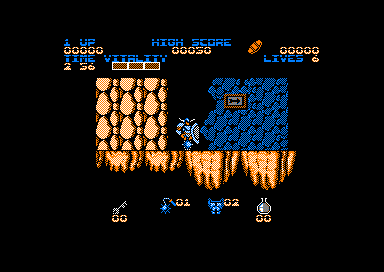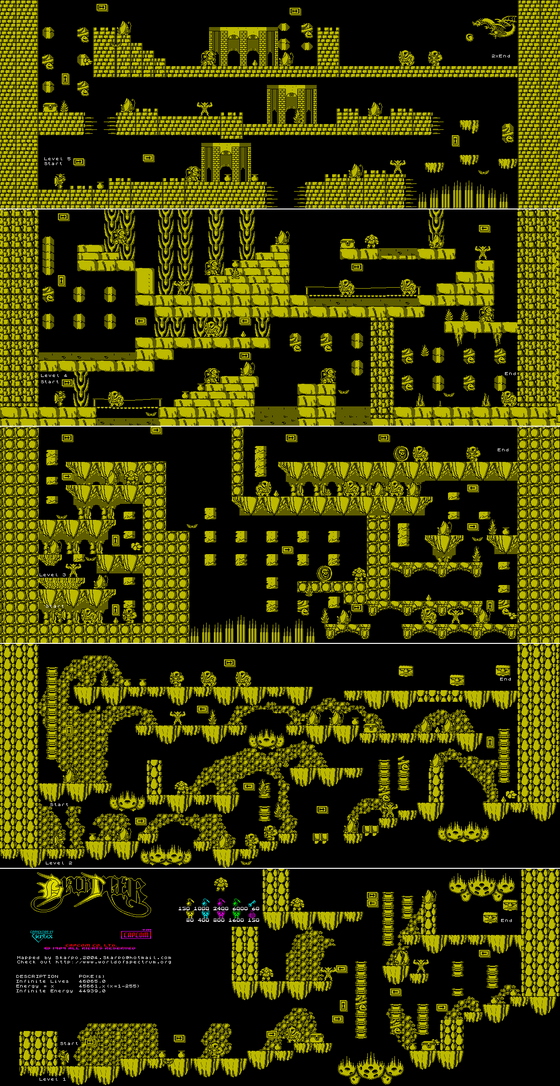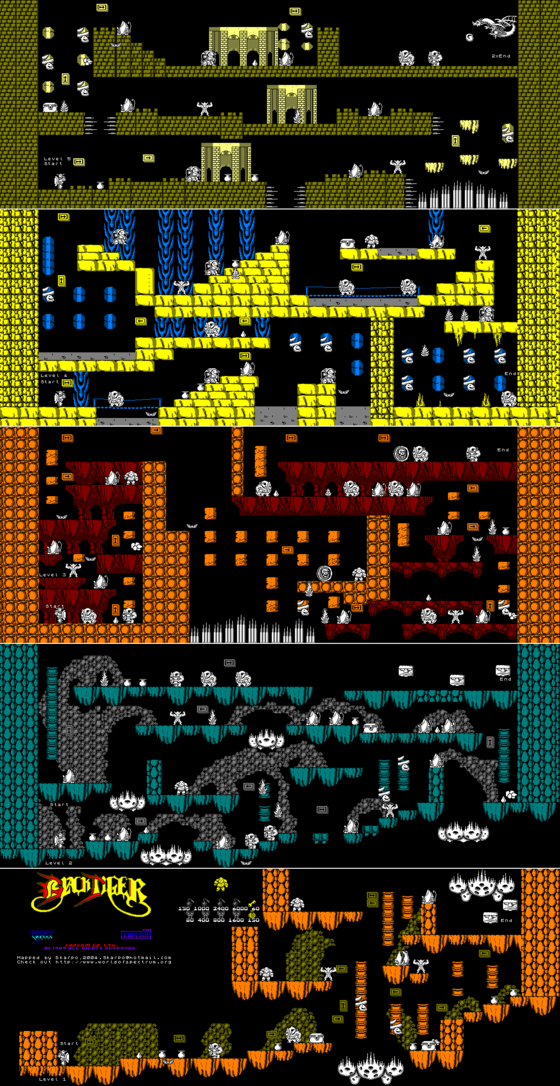Difference between revisions of "Black Tiger CPC-Spectrum Comparison"
m (→Lazy port ?=) |
m (→Screenshots) |
||
| (One intermediate revision by one other user not shown) | |||
| Line 3: | Line 3: | ||
And even more infamous because the speccy's original version is not even that good to begin with. | And even more infamous because the speccy's original version is not even that good to begin with. | ||
| − | *Graphics : the Amstrad version use unmodified | + | *Graphics : the Amstrad version use unmodified Graphic Data. |
| − | The Sprites and tiles are stored in RAM in 1bit per pixel, sprites are also masked in 1 bit per pixel. the 1bpp | + | The Sprites and tiles are stored in RAM in 1bit per pixel, sprites are also masked in 1 bit per pixel. the 1bpp data is then turned into Mode1 2bit per pixel when they are to be displayed into the Video RAM area. Which is somewhat CPU intensive. |
*Also some Raster interrupt are used in order to get more than 4 colours displayed on the screen. | *Also some Raster interrupt are used in order to get more than 4 colours displayed on the screen. | ||
| Line 20: | Line 20: | ||
[[Image:Black tiger screenshot.png|Black Tiger (Amstrad) ]] | [[Image:Black tiger screenshot.png|Black Tiger (Amstrad) ]] | ||
| + | |||
| + | *AmstradCPC mockup | ||
| + | |||
| + | [[Image:Black tiger redone 11 CPC mode1.png|Black Tiger (Mockup Amstrad) ]] | ||
==What If ?== | ==What If ?== | ||
| Line 32: | Line 36: | ||
| − | *As the sprites are 1bpp + 1bpp mask , this means that if properly recoded in 2bpp they use the exact same amount of DATA in RAM, but could then be in 3 colours, 4th colour being used as mask, | + | *As the sprites are 1bpp + 1bpp mask , this means that if properly recoded in 2bpp they use the exact same amount of DATA in RAM, but could then be in 3 colours, the 4th colour being used as a mask, as used in super wonderboy (this is not shown on mock up) |
| − | *Also it may be possible to apply some | + | *Also it may be possible to apply some kind of "attribute colour" on the tiles so the Background and Foreground tiles, while still being 1bpp/2 colours...you may be able to set the ink (other than black) into one of the 3 other inks (from the Mode1 palette) as shown on the Map Mockup. |
| − | *Then get rid of Rasters interrupts/palette change to gain some CPU or even the | + | *Then get rid of Rasters interrupts/palette change to gain some CPU or even free the minimal RAM needed by such routine.. |
There, you have a better version than the speccy one. | There, you have a better version than the speccy one. | ||
| Line 42: | Line 46: | ||
==Lazy port ?== | ==Lazy port ?== | ||
| − | It is | + | It is also worth noting that the Disk version actually uses multiloads as it seems to reload data between each levels. So it would seem that the Amstrad version is just a lazy, hurried port. |
Such a shame for what used to be one of the best Arcade Game of 1987. | Such a shame for what used to be one of the best Arcade Game of 1987. | ||
Latest revision as of 20:41, 14 January 2020
Black Tiger is quite infamous for being one of the laziest speccy port.
And even more infamous because the speccy's original version is not even that good to begin with.
- Graphics : the Amstrad version use unmodified Graphic Data.
The Sprites and tiles are stored in RAM in 1bit per pixel, sprites are also masked in 1 bit per pixel. the 1bpp data is then turned into Mode1 2bit per pixel when they are to be displayed into the Video RAM area. Which is somewhat CPU intensive.
- Also some Raster interrupt are used in order to get more than 4 colours displayed on the screen.
But the main problem is that it is quite useless as the Game's window is still monocolour ! So it simply wastes CPU power.
Screenshots
- ZX Spectrum
- Amstrad CPC
- AmstradCPC mockup
What If ?
- What we quite got :
- What we could at least have :
- As the sprites are 1bpp + 1bpp mask , this means that if properly recoded in 2bpp they use the exact same amount of DATA in RAM, but could then be in 3 colours, the 4th colour being used as a mask, as used in super wonderboy (this is not shown on mock up)
- Also it may be possible to apply some kind of "attribute colour" on the tiles so the Background and Foreground tiles, while still being 1bpp/2 colours...you may be able to set the ink (other than black) into one of the 3 other inks (from the Mode1 palette) as shown on the Map Mockup.
- Then get rid of Rasters interrupts/palette change to gain some CPU or even free the minimal RAM needed by such routine..
There, you have a better version than the speccy one.
Lazy port ?
It is also worth noting that the Disk version actually uses multiloads as it seems to reload data between each levels. So it would seem that the Amstrad version is just a lazy, hurried port.
Such a shame for what used to be one of the best Arcade Game of 1987.
